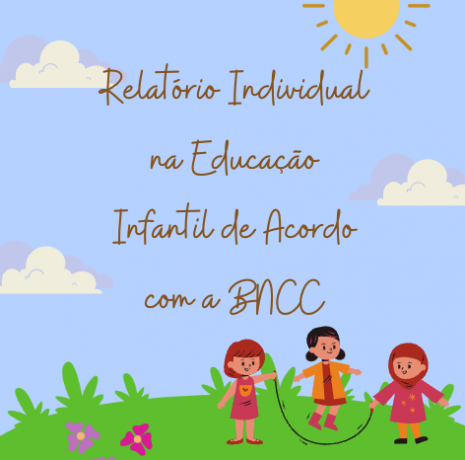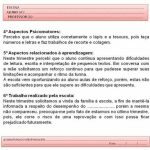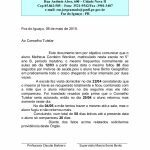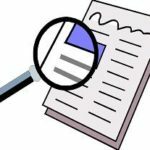How to do it and Examples: Find out how to prepare individual quality reports in Early Childhood Education, in line with the National Common Curricular Base (BNCC)
Have you ever wondered how to prepare individual reports in Early Childhood Education according to the BNCC? In this article, we will teach you step by step how to do it and provide examples and tips to help you in this important task.

An individual report in Early Childhood Education is a document that records the development and progress of each child in relation to the objectives and competences established by the BNCC. This report aims to provide a comprehensive overview of cognitive, socio-emotional, motor and language skills of each student, highlighting their strengths, challenges and advances over the period academic.
The first step is to collect relevant information about each child. This may include daily observations, activity logs, work completed, teacher notes, and interactions with peers.
Based on the BNCC and the established learning objectives, identify the aspects that will be evaluated in the report. This may include social skills, emotional skills, motor development, oral language, mathematical knowledge, exploration of the environment, among others.
Organize the report into sections that correspond to the different aspects evaluated. Use clear, simple and accessible language, avoiding technical jargon. Divide the report into topics and use subheadings to make it easier to read and understand. Highlight each child's strengths and areas of development in a balanced and objective way.
Include concrete examples and evidence to illustrate each child's development. This can be done through descriptions of activities carried out, work produced, photographic records or excerpts from significant dialogues. This evidence helps make the report more complete and authentic.
Finalize the report with final considerations, highlighting the progress, achievements and challenges faced by the child. Be clear in guidelines for parents and guardians, highlighting strategies and suggestions for how to support the child's continued development at home.
Here are 3 dummy individual report examples.
Student ID
Socioemotional Development Maria demonstrates an excellent capacity for social interaction, establishing positive relationships with colleagues and showing empathy in everyday situations. She respects classroom rules and is proactive in resolving conflicts, seeking peaceful solutions.
Cognitive Development In the cognitive aspect, Maria shows to be a curious child and interested in learning. She demonstrates advanced problem-solving skills, using creative strategies to find solutions. Maria also shows a good command of basic mathematical concepts such as counting, term-to-term correspondence and the notion of quantity.
Language Development Maria presents a good development of oral language, expressing herself clearly and coherently. She uses a wide and diverse vocabulary, demonstrating narrative skills when telling stories and expressing her ideas. In addition, Maria shows an interest in writing, showing effort to write her own name and a few simple words.
Final Considerations and Guidelines Maria is a dedicated student who is enthusiastic about her activities. Their socio-emotional, cognitive and linguistic development are remarkable. For their continued progress, it is recommended to encourage reading and writing, as well as developing activities that promote problem solving and critical thinking.
Student ID
Socioemotional Development Pedro is a friendly and collaborative child, establishing good relationships with peers. He demonstrates empathy in his interactions and seeks to help colleagues when needed. Pedro also shows emotional self-regulation skills, being able to express his emotions appropriately.
Cognitive Development In the cognitive aspect, Pedro has a great capacity for logical reasoning and problem solving. He demonstrates advanced math skills, solidly grasping addition, subtraction, and counting concepts. Pedro also shows an interest in reading, demonstrating fluency and comprehension in texts suitable for his age group.
Language Development Pedro has a good command of oral language and uses a diverse vocabulary. He is able to express himself clearly and coherently, constructing complex sentences and articulating his ideas effectively. Pedro also shows an interest in writing, seeking to develop his skills in the production of texts.
Final Considerations and Guidelines Pedro is a dedicated and motivated student in his activities. Their socio-emotional, cognitive and linguistic development is admirable. For your continuous progress, it is recommended to stimulate reading, practice mathematical activities challenges and the promotion of spaces for written expression, encouraging you to expand your skills in this area.
Student ID
Name: Joao Silva
Age: 5 years
Evaluated Period: 1st half of 2023
Socioemotional Development
João demonstrates advanced social skills, interacting positively with peers and respecting the rules established in the classroom. He demonstrates empathy, being able to understand and express his emotions appropriately.
Cognitive Development
João has good cognitive development, showing an interest in learning and actively participating in the proposed activities. He shows promising math skills, demonstrating an understanding of numbers, quantities and patterns.
Language Development
In the linguistic aspect, João demonstrates a good command of oral language. He is able to communicate clearly and coherently, using vocabulary appropriate for his age. João also shows an interest in reading, exploring different literary genres.
Final Considerations and Guidelines
João is a dedicated, curious and participative student. Their social interaction skills, logical thinking and developed language are strengths that should be encouraged. As an orientation for parents, it is suggested to continue encouraging reading and promoting activities that involve the development of mathematical skills.
Preparing an individual report on Early Childhood Education according to the BNCC can be an enriching and meaningful process for understanding the development of each child. By following the steps and using concrete examples and evidence, it is possible to provide feedback valuable to parents and guardians, as well as creating a record of student progress and achievements over the course of of time.
Remember that each child is unique, with their own pace of development. Therefore, individual reports should reflect this uniqueness and help plan personalized pedagogical strategies for each student.
We hope that this practical guide and the examples provided will help you to prepare individual reports of quality in Early Childhood Education, in accordance with the BNCC.
Did you like it? Share this post on your social network
 SPECIAL STUDENT INDIVIDUAL REPORT
SPECIAL STUDENT INDIVIDUAL REPORT
 Disciplined Student Report to the Tutelary Council
Disciplined Student Report to the Tutelary Council
 Individual Report of the Student with Special Needs
Individual Report of the Student with Special Needs
 INDIVIDUAL REPORT - EVALUATION IN CHILDHOOD EDUCATION
INDIVIDUAL REPORT - EVALUATION IN CHILDHOOD EDUCATION
 Phrases to end a report on early childhood education
Phrases to end a report on early childhood education
 Individual report template for Early Childhood Education
Individual report template for Early Childhood Education
This site uses Akismet to reduce spam. Learn how your feedback data is processed.